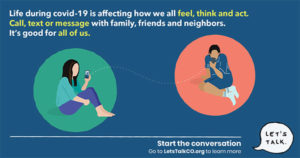Covid-19
All our feelings matter.
We are all doing our part to address covid-19, and it’s not easy. You may be feeling stressed, depressed or have a hard time sleeping. But we’ll get through this together. Talking about how we feel, and starting that conversation with others, supports our own health and the well-being of our entire community.
Dr. Glenn Most, Executive Director at West Pines Behavioral Health, explains why talking to each other is so important as we all manage our lives during covid-19.
How are you feeling?
Covid-19 is taking a toll on all of us. If you can relate to any of these feelings or behaviors, it’s important to understand it may be a result of the pressure and strain we are all under right now.
- Sadness or despair
- Feeling afraid or anxious
- Being angry, irritable, or arguing frequently
- Having trouble falling asleep or sleeping soundly
- Increases and decreases in energy level
- Confusion, forgetfulness, or inability to concentrate
- Repetitive thoughts or behaviors
- Loss of appetite or eating too much
- Loneliness
- Feeling apathetic, being unable to enjoy activities
Feeling guilty - Increased desire to use alcohol, tobacco or other drugs
Materials for social media, printing and other use can be found in the Let’s Talk Covid-19 Toolkit.

What we can do?
We’re all going through a difficult time, but we’re doing it together. Here’s a list of things we can all do to support ourselves and others in our community along the way:
- Stay connected. Call, text, email or web chat with family members, friends, coworkers and others in your life. Talk about how this situation makes you feel and ask them to do the same. Talk about unrelated, lighthearted and enjoyable topics too.
- Support others. Studies prove that helping others in times like these is beneficial to the person receiving help and those offering it. Checking in with neighbors or colleagues, especially those who are older or may already be isolated, is just one way you can help.
- Maintain a routine. Schedule time for responsibilities and household duties, as well as time to relax or do something rejuvenating like taking a bath, listening to music, or exercise.
- Eat and rest well. Prepare healthy meals and snacks. Rest or nap when you can throughout the day. Eat meals and get to bed at a regular time each night.
- Stay active. Set aside time each day to take walks, garden or just sit outside and get some fresh air. Maintain physical distancing guidelines and wear a face covering. Work on hobbies or explore new ones, read and be creative.
- Be kind to yourself. We won’t always handle things perfectly, or be as organized and productive as we were before this began. We may lose our temper, forget things or get behind on chores. Be as fair and gentle with yourself as you would hope others would be to you.
- Be kind to others. Social interaction is limited, but be patient and understanding at the grocery store, with coworkers, or others in your home. Everyone is feeling the effects of this.
- Remember this situation is temporary. We don’t know how long physical distancing and other safety measures will be in place, but we will get through this.
- Take breaks from the news and social media. Constantly checking the news can make us anxious about things we have no control over. Cut down on stress by limiting time scrolling social media feeds or checking for updates. Make sure sources you read are accurate and reputable (World Health Organization, Centers for Disease Control and Prevention, etc.)
- Seek information and support. See the list of Resources on this page and find one that fits your needs. Explore others if the first one you try doesn’t feel right for you.
Resources:
Even after trying the strategies above, you may find you’re still not feeling quite like yourself. Check out these websites and organizations to find additional support. If you need immediate mental health support, go to Colorado Crisis Services or call 1-844-493-TALK (8255) or text TALK to 38255 to speak to a trained professional.
- Colorado-specific updates, resources and information: Colorado Department of Public Health and Environment (CDPHE)
- Financial support, tools for older adults, domestic violence survivors, veterans, parents, LGBTQ, and more: Mental Health America (MHA)
- Talking to children about covid-19: National Association of School Psychiatrists (NASP)
- Free health, housing, sobriety and other resources: Mental Health Colorado
- Comprehensive resource and information guide: National Alliance on Mental Illness (NAMI)
- Coping with Stress during covid-19: World Health Organization
- Coping with traumatic events: National Institute of Mental Health (NIMH)
- Training to identify mental health challenges: Mental Health First Aid
- For those experiencing job loss: OnwardCO
- Assistance for Immigrants: Immigrant Resource Guide (Español)
- Child Care for Essential Service Providers: Colorado Emergency Child Care Collaborative
- SAMHSA Disaster Distress Helpline: 1-800-985-5990; or by texting TalkWithUS to 66746
- Current national information and resources: Centers for Disease Control and Prevention (CDC)

